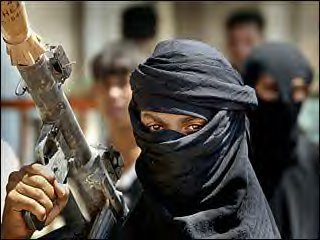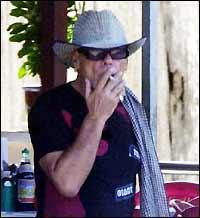I've Repeatedly Said The US Has To Deal With Moqtada Al-Sadr

The guy's just too important and powerful in Iraq to be ignored indefinitely.
The killers had waited in the street, two of them scanning the crowd of afternoon shoppers for the young Iraqi they knew to be an informant for U.S. forces. When he appeared, they made their move. Seeing a pistol raised, the informant had turned to run, but too late. Three shots left him dead, blood flowing from wounds in his chest as the gunmen disappeared into the web of narrow streets that form the Shi'ite warren known as Washash.
Capt. Johnny Sutton took it hard when he heard the news. Tall with an angular face and calm eyes, Sutton seemed at turns shaken and angry as initial reports of the shooting reached him at an Iraqi army base nearby. Sutton was one of the few Army officers who personally knew the informant, believed to be about 19 years old, with family in the neighborhood. For roughly four weeks, Sutton and other Army officers had worked with him to gather intelligence on the local activities of militia loyal to Shi'ite cleric Muqtada al-Sadr.
"He was the key piece," says Sutton of his slain source. "He was a good kid."
Although there was little evidence of the identity of the shooters at the scene of the shooting, Americans who know the area had little doubt over who was responsible. Sadr's militia, the Mahdi Army, is increasingly active in Washash, which some U.S. troops now call Little Sadr City. Sutton believes they are working to make Washash a Mahdi Army stronghold west of the Tigris. Until now, the militia's base in the capital has been Sadr City on the east bank of the river, a sprawling slum that houses some 2.5 million Shi'ites. The Mahdi Army's expansion across the river complicates the efforts of U.S. forces to quell sectarian violence.
...
When U.S. patrols rumble into the area in armored vehicles, pigeons soar as lookouts signal their comrades as to the Americans' whereabouts. Gunfire often follows. Typically militia fighters will fire a volley of shots at a checkpoint manned by Iraqi security forces near a U.S. patrol. They may linger to fire a few more shots at U.S. troops arriving in the big green Stryker vehicles, but then they usually vanish. Like the killers who brought down the U.S. informant, the gunmen are seldom identified. But U.S. troops patrolling Washash assume they are Mahdi Army fighters operating with approval from higher-ups in the organization.
The Mahdi Army and U.S. forces have clashed openly several times in the past three years, fighting sometimes for days in battles that end inconclusively with uneasy truces. Today, senior officials on both sides insist they hope to avoid another round of bloodletting. And yet the mounting violence in the capital looks set to draw them into a new confrontation.
(read more)














0 Comments:
Post a Comment
<< Home